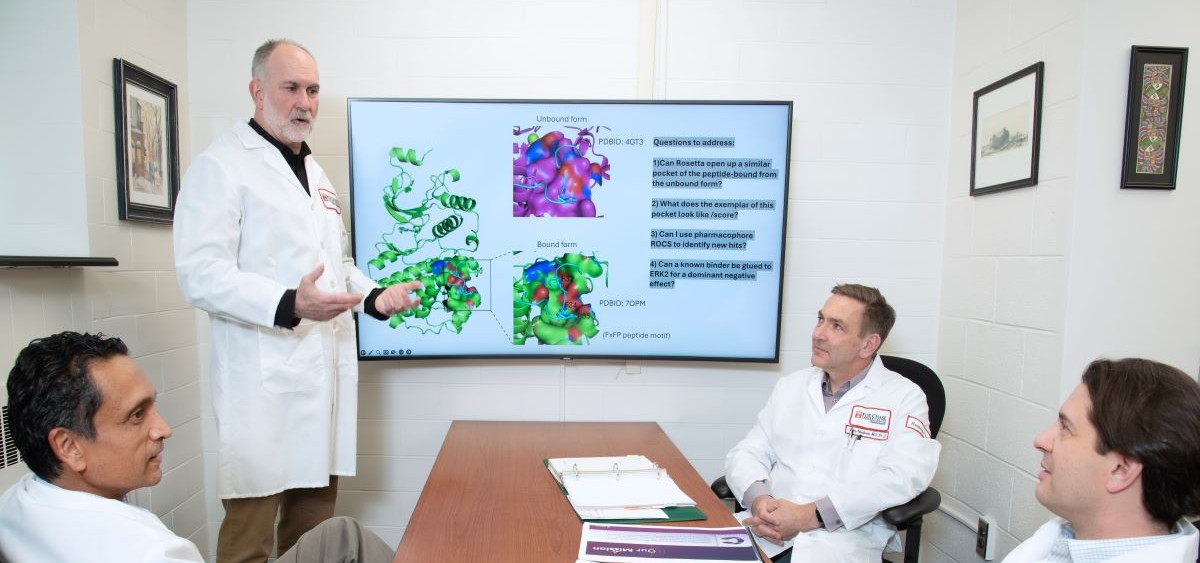Related Articles
00 / 00

The Center for Immunology (CFI) is rooted in pioneering investigations made by Fox Chase scientists into how the immune system develops, and how it fights viral infections and cancers. Building on these historical strengths, current CFI research spans the spectrum of immunology, from the mechanisms by which disruption of normal immune cell development leads to blood cancers to the processes underlying inflammation within tumors (and how these may accelerate or blunt tumor growth), the ways in which the aging immune system becomes dysfunctional, and the means by which unique interactions between immune effectors and their targets can be exploited to improve cancer immunotherapy.
The Center is headed by Siddharth Balachandran and David Wiest as Basic Science Co-Directors. New and established collaborations between CFI members and those in other Programs (e.g., Nuclear Dynamics and Cancer and Cancer Signaling and Microenvironment) and Institutes (e.g., The Marvin and Concetta Greenberg Pancreatic Cancer Institute) accelerate the translation of basic science observations. Progress toward this goal is aided by the inclusion of clinicians and clinical scientists interested in mobilizing lab-based findings for rapid translation into immunotherapy-related clinical trials. These translational efforts are shepherded by Clinical Science Co-Directors, Igor Astsaturov and Matthew Zibelman.
Immunology research at Fox Chase has coalesced around three related themes:
1. Immune system development and its dysregulation in blood cancers
Center members study fundamental processes controlling hematopoiesis, and assess their relevance to the etiology or treatment of hematologic malignancies. A major strength is its high-caliber expertise in immune cell development, and in the assessment of how dysregulated hematopoietic processes spark transformation. The Center has an extensive track record and established expertise in the study of B cell, T cell, and myeloid cell development, which has revealed novel therapeutic vulnerabilities in B cell lymphomas, as well as of acute myeloid leukemia (AML). Efforts to understand the inflammatory etiology of particular hematologic malignancies link the development and inflammation themes. As examples, David Wiest has identified a novel ribosomal protein RPL22 as essential for alpha-beta T cell development, Dietmar Kappes isolated ThPOK, the master regulator of CD4/8 lineage commitment, and Yibin Yang has implicated dysregulated ubiquitination signaling in lymphomagenesis. These endeavors are aided by the Zebrafish facility, headed by Jennifer Rhodes, and the Transgenic Mouse Facility, headed by Dietmar Kappes.
2. Inflammation, innate immunity, and their roles in tumor development and therapy
This theme is nucleated on how inflammation promotes cancer progression and how innate immunity can be exploited for cancer therapy. The Center's long-standing connection to chronic and oncogenic virus infections was foundational for current efforts aimed at defining how inflammatory and innate-immune processes both promote and prevent tumorigenesis. Studies on immunogenic cell death mechanisms have had a major impact in revealing a critical new approach for leveraging innate immune signals to render cold tumors sensitive to immunotherapeutic interventions. The exploration of innate immune agonists as potentiators of immunotherapeutic interventions links the inflammation and immunotherapy themes, as highlighted by ongoing efforts in the Cañadas and Balachandran labs, each of which seeks to leverage endogenous retroelements – and the innate immune pathways the activate - for cancer immunotherapy. Conversely, the Font-Borgada lab examines how dysregulated inflammation can provoke tumorigenesis and metastatic seeding in organs such as the liver. Exciting new areas of CFI research, initiated by the recent recruitment of Mitchell Fane, PhD and Yash Chhabra, PhD will examine how the aging immune system becomes dysfunctional and how sex differences affect tumor development and therapy responses
3. New frontiers in immunotherapy
This focus leverages insights into the control of immune cell function to optimize their efficacy as anti-cancer effectors. Center members explore how the action of immune cells can be controlled, with the aims of reversing unresponsiveness to immunotherapy and preventing immune exhaustion. Exciting insights into innate immune signaling are being leveraged pre-clinically as well as in clinical trials to enhance the efficacy of immune checkpoint blockade. These efforts have led to discoveries that have and will produce pioneering clinical trial concepts. Examples include the potentially practice-changing discovery that interferon priming mitigates immunotherapy-related adverse events, and virus mimicry-based approaches to activating innate immune responses in cold tumors, using the ZBP1 agonist CBL0137. In these efforts, the Immune Monitoring Core, headed by CFI member Kerry Campbell provides advanced immune cell correlative analyses for ongoing trials.


